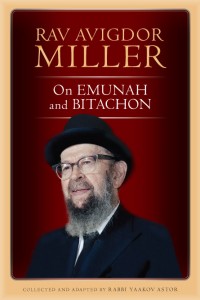 Life is good.
Life is good.
Look at your overall blessings and you will see the good.
But at times we encounter the unpleasant. We have the power to overcome these situations.
G-d does not put us in a situation we cannot overcome.
One such situation is dealing with the abusive individual.
This could be physical, mental or spiritual abuse.
Some have an abusive spouse, parent, boss or friend.
So what to do?
It really depends – each person must evaluate their own situation and take action – but here are some suggestions:
Understand Them
Understand the root causes of what is driving their abuse and deal with the root causes not just the symptoms. One of the reasons that some revert to abuse is because of their low self-esteem. Or it could be they grew up in an abusive home and they mimic the behavior of their parents. This does not mean that you should suffer for it. They have a responsibility to act correctly. But understanding the root of this behavior can help you react in a more intelligent way.
Speak with a Torah Authority
A Rav (an Orthodox Rabbi) usually have Daat Torah. Meaning that they can tell you what the Torah’s perspective of the situation and how to deal with it. It is important that one consults a competent Rav regarding a situation that one has outlook questions. (like Where one should send their children to school, where is a good place to purchase a house, how to deal with an abusive spouse, etc.) If he does not have the necessary background to deal with such an issue, he can likely direct you to someone competent who can.
Get Advice from Professionals and Friends
A hotline that deals with abusive spouses in the Jewish community is called the Shalom Task force. They give advice based upon the precepts of the Torah. It is best to consult others first so that you will know what the best way is to approach the abuse without incurring more.
Some Organizations – include Shalom Task Force – which deals with Shalom Bayit / Peaceful Marital Relations and marital abuse.
Ohel is another organization that has a wide variety of social services for the Jewish Community.
In Israel – Yad Leachim – which deals with Marital abuse, Missionary Abuse, and more..
יד לאחים – בעברית – עזר ליהודים נגד אלימה Francais / Russian
Speaking with family and friends for useful advice is also recommended. Sift out what is proper advice and what applies to your situation.
Confront in a peaceful time
At times, when the person is calm, one can confront that person with the issues and tell them straight – “I don’t appreciate your insults when I do something not to your liking. Let’s talk it out calmly instead.”
Set Limits for them and For Yourself
At times a person does not know they are abusive. You can explain to them in a gentle tone during a calm time “when you yell out loud it frustrates me. Please try to always talk calmly to me.”
Explain to them the limits of what is abuse.
Here are some of the things that are considered abuse – if done in an improper measure
Yelling
Cursing
Intimidating
Insulting
Forcing a person to do something against their will
Silent Treatment
Striking
Violence
Threatening
Scaring
Imposing
Asking one to do something against the law or the Torah
Drawing the Line
Set limits for yourself. You must define precisely exactly what you feel is abuse and then either speak with them or take action – like “if he yells again without regard for correction I will speak with his parents or force him to get a social worker or leave him”. Beating a Spouse is 100% forbidden according to Torah. A victim in such a situation should speak immediately to one of the organizations above to receive help to get them out of the situation or out of the marriage.
Show your teeth
At times the abusive person is a “Paper Tiger”. If you stand up to them, they might back down. It happens that they back down when resisted or put into place. However, they might get more abusive. It is up to you to find the proper balance and tone of standing up to them.
Imagine how to react ahead of time
When that person starts a tirade, or insults or other abuse, think ahead of time of how you will react. In this manner you will be more in control of the situation.
Get them Psychological help:
Their is a personality Disorder called APD – Abusive Personality Disorder. A person basically uses their resources or methods available to get what they want. They will not be concerned about feelings of the other. They can threaten, flatter, use scare tactics or physical violence or mental abuse to get what they want. Speak with them at a calm time that you suggest that they see a social worker or psychologist. The Social Worker or psychologist should preferably know the laws and the psychology of the Torah – for sometimes a psychologist may prescribe actions that are contrary to Torah, making the situation worse.
Avoid the Forgiveness-Abuse Cycle
Abusive spouses or people are not always abusive – they do sleep. Sometimes they are abusive and at times they bring a facade of friendliness or repentance. The victim feels bad for the person and continues the relationship until the next abuse surfaces. The “kindliness” is part of the abuse. It is a way for the perpetrator to keep a hold on the victim. Be smart and if you are part of the vicious cycle – and see no real amelioration – take counsel from Torah authorities – and if the need be, run for the door.
Make a Plan and Take Action
Have a limit. If the abusive person continues, take positive action – according to Torah, to alleviate your suffering.
Abandon or avoid
Some people are best to avoid. If you have an abusive boss or significant other that it is not worthwhile to keep the relationship going – it may better to avoid and abandon them than to deal with daily abuse. Find a new Job with a boss that acts respectfully towards workers. There are ways to avoid people saying a truthful excuse – like I can’t meet this week I have a previous engagement.
Protect Yourself
If the person is violent, in extreme cases it might be best to runaway without notice. If the violence reaches a point that is unacceptable calling the police or defending oneself is also recommended by Torah. Your life takes precedence. According to Torah, if one’s life, G-d forbid, is actively threatened one may take action by maiming or even killing the pursuer.
Avoid Getting involved with Such People
Some people are known to be abusive. Some hide the fact until they suck a person into their trap. Many people act very nicely and properly before marriage, but when married they become a terror.
The Torah has very specific laws and advice for a person before they get married. They should be from a similar background. Jewish people marry Jewish. One Should check the background of a person before they get married. These laws usually help a person to assure one will end up with a compatible mate – one that one can build a happy life together and a family that has Torah values.
The Torah’s way is first for a person to use their head to select a mate. Afterwards love comes. Not first love then marriage. Love blinds at times. Using “Love” as the reason to get married – is one of the reasons for the high divorce rate. This is a reason for why many get involved with abusive spouses. Either they did not do enough homework to find out about their mate before marriage or they think “Love conquers all”. Get real. Do your due diligence.
Ask their friends, family, acquaintances about their personality, values, openness to advancement, character traits, Jewish Outlook (Hashkafa), level of Torah Study, level of Torah observance, etc. When asking questions ask very detailed questions like “Does this person have any psychological issues? Have you ever seen them being abusive? What is the worst encounter you ever had with this person?, etc.” Don’t ask “Is he a nice person?” and feel you have asked enough. Anybody can act nicely at times.
You may have to spend the rest of your life with a spouse, it is unconscionable for your own sake not to inquire about them. Investing in a dead end marriage – because your are “in love” – is basically a waste of time. Sometimes after years of suffering, people divorce and they are too old to establish a family.
One of the objectives of Marriage is to help a person reach their potential in bringing good to the world and serving Hash-m properly. Being stuck in a dead end marriage, stifles one’s ability to achieve their potential and purpose in life.
Compatibility with Torah values is more important than “love” when selecting a mate. A person can fall in love with an abusive person who will also abuse the children. It’s not worth it for “love”. When buying a car one does much research, even more so a person should do so when selecting a life mate.
Prayer
Pray to Hash-m that he guides you the right way to avoid the abuse of the person. Pray that the person changes. Or pray that He helps you avoid that person. Pray that He finds you another Job with a non-abusive boss. Pray for a peaceful day.
Ein od milevado
Strong Belief in Hash-m (G-d) that only He is in control is another way to nullify the person’s abuse. Ein Od Milevado – means that “There is only Hash-m.” Beleiving this strongly one can nullify the will of another person. (Get the Card Here)
 Emunah is Belief that Hash-m runs and Guides the World. Bitachon is Faith in Hash-m that He is guiding our lives in the best way for each of us personally. Having the Torah’s outlooks in both helps us live with a positive attitude daily.
Emunah is Belief that Hash-m runs and Guides the World. Bitachon is Faith in Hash-m that He is guiding our lives in the best way for each of us personally. Having the Torah’s outlooks in both helps us live with a positive attitude daily.








